- ▼FEEDING MY HORSES WITH IR AND CUSHINGS
-
Customer: “Lucas, my 9-year-old TWH is insulin resistant. He is on Thyro-L to drop his sugar levels, and on a restricted 5 lbs Grass Hay, 10 lbs Bluegrass straw per day. Is there is any added risk of laminitis or founder when we switch from SmartPak to horse guard? And Ray, our 29-year-old, is Cushings. So far, God Bless, he is not laminitic – same question. Safe for insulin compromised/laminitic potential horses?”
Answer by Ph.D. Equine Nutritionist, Kelsey Johnson Nonella: There are no added carbohydrates or sugars in our products so they are safe for insulin resistant and laminitic horses, so Lucas and Ray should do great on our products. - ◄3 MG OF SELENIUM FOR MY HORSE WITH PSSM
-
Customer: “My horse has possible PSSM. He is a 1300lb Gypsy Vanner and his vitamin E & Se levels are low. I’m considering your product and the Vit E level in it is perfect but I’m concerned that the 3mg is too much ( my vet has recommended 1mg). My horses lab results are as follows: VitaminE serum = 1.98, Ref range 2.00-4.00 units ug/ml, Selenium Serum = 109, Ref range 120-180 units ng/ml. Any thoughts?”
Answer by Ph.D. Equine Nutritionist, Dr. Kelsey Johnson Nonella: I am sorry to hear about your Gypsy Vanner. Selenium and vitamin E serve as antioxidants to aid the body in removing harmful free radicals from the body caused by oxidative stress. Signs of selenium and vitamin E deficiency can include muscle cramping and stiffness, much like PSSM. I think that 3 mg of organic selenium will benefit your horse greatly. I did my doctoral research on selenium in horses. Horses supplemented with 3 mg of organic selenium have been showed to have increased immunity and combat oxidative stress more effectively than horses supplemented with 1 mg of selenium. If you are interested in reading an article on my research here is a link to the article https://www.horseguard.com/innovative-selenium-research/ Increasing your horse’s selenium and vitamin E levels will help him to handle his PSSM better. I would also recommend feeding no grain, and only grass hay. If he needs extra energy, feed him something low in starch and high in fat, such as soybean meal or beet pulp. - ◄INSULIN RESISTANCE?
-
Customer: “We moved to San Diego from Bend/Redmond four years ago and brought our, now 24, quarter horse with us. He’s always been an easy keeper and for 15 years we have given him Horse Guard. We are now seeing this product on the shelves of some feed stores. However, he has just tested positive for Cushing’s (54) and started on meds. We have soaked his Orchard hay to remove sugar, he’s lost 50#, looks good. The soaking seems to be why we aren’t dealing with insulin resistance. However, I’m concerned about his vitamin, mineral intake. Your analysis says the pellets have corn flour. I’ve been told no corn, oats, or grains, only hay and hay pellets. Is your product appropriate for a horse with these issues.”
Answer from Equine Nutritionist, Del Johnson: Thanks for your question and your business. Insulin resistance is a common problem in horse health. As you know it is caused by available starches and sugars and an inability to metabolize them in the large quantities that they exist in normal high grain diets. Soaking hay helps because it removes some of the sugars and reduces stress on the system. There still remains a substantial quantity of sugars and starches in the ration but at a level that the horses can digest properly. The dosage of 2 ounces of Horse Guard is so small and the carriers in Horse Guard even smaller that the starches in the corn and wheat have very little effect on the total sugar starch content of the total 22 lb daily diet of the average horse. That is a long way of saying that although there is a small amount of starch in Horse Guard it will have no negative effect. I hope this helps. - ◄DIFFERENCE BETWEEN OATS OR BEET PULP?
-
Customer: “My question is whether to feed my horse oats or beet pulp? I’ve been seeing many articles on feeding them instead of commercial grains to horses, but am confused on which is best since the article does pros on just that product. Are there major differences in them, do feeding amounts matter, what are pros and cons to both? My horse is an easy keeper so he really only gets enough grain to eat his Horse Guard supplements and not feel left out while everyone else is getting some!”
Answer from Ph.D. Equine Nutritionist, Dr. Kelsey Johnson Nonella: Thank you for the question. Oats and beet pulp are good feedstuffs to provide your horse with energy. They cater to different needs in feeding. Oats are a great, traditional grain. The energy source of oats comes from starch, which is perfectly fine unless you have a horse with a metabolic disorder. Beet pulp is high in fiber and low in starch. It is a by-product that is a good feedstuff for horses with metabolic disorders, and horses that are “hot”. When feeding one of the products along with hay, you can cater the amount fed to the amount of energy the horse needs. Since your horse is an easy keeper, I think you are doing a great job by just feeding enough grain to get him to eat his supplements. You are smart to feed oats or beet pulp rather than a commercial feed because you are getting all the vitamins and minerals that you need in your Horse Guard top-dress supplement, and are saving money by not feeding additional, unnecessary vitamin/mineral supplementation. In summary, these feedstuffs are both good. They just cater to different needs. If I were you, I would feed whichever is more cost-effective for you. With good hay and supplementation, your horse should be getting what he needs. Thank you for taking such good care of your horse. - ◄FEEDING A HEALTHY DIET TO MY MINIS WHO HAVE FOUNDERED
-
Customer: “I have two mini’s both of which have been foundered (one of them has cushings). I’m concerned about whether I’m feeding them correctly. I’d been told by a farrier to feed them just grass hay but I've also included in their daily ration a little apple and vitamins. I'm’ wondering if this diet is too resisted as they always seem to be hungry and a little lethargic. Recently I read on the internet that insulin-resistant horses should be eating Timothy or Orchard grass, low-fat, low-carb., high protein pellets, and some grass. As this goes against everything I was told I’m looking for advice on what would be a good safe nutritious diet to feed them.”
Answer by Ph.D. Equine Nutritionist, Kelsey Johnson Nonella: Minis are very prone to metabolic disorders. They typically only need grass hay, with at least 8% protein which timothy and orchard grass both have, and a vitamin-mineral supplement. Depending on where you are located, there are warm-season grass hays, such as brome, that only provide 4-6% protein. I would recommend feeding them Horse Guard, adjusted to their weight, and allowing them access to a high-quality grass hay ad libitum. If they gain too much weight on free-choice hay, you may have to cut back on their hay consumption. The vitamin-mineral will provide them with nutrients that are typically lacking in hay, and is especially important for the mini with cushings. A few slices of apple are ok, however, they do contain a lot of sugar so feed them very sparingly. As far as green grass, AVOID it. Green grass is high in sugar and is not recommended for horses that have foundered. - ◄SUPPLEMENT WITH NO IRON FOR IR HORSE
-
Customer: “I saw your product for the first time today and was very interested in trying it BUT saw that is has iron in it. I have been reading in the ECIR.org site for IR horses and iron has the potential to be bad for IR horses. Do you make a similar product without iron?”
Answer by Ph.D. Equine Nutritionist, Kelsey Johnson Nonella: We sell an organic selenium and vitamin E product which provides 3 mg of organic selenium and 5000 IUs of vitamins. It is great for helping with immunity and muscle function. We also have great hoof and joint supplements that don’t contain iron. However, when considering Horse Guard in each dose there is only 50 mg (compared to products like Red Cell that contain 300 mg per dose). The daily requirement a 1,100 lb horse at maintenance is 400 mg. You may consider analyzing your hay to see how much iron in total your IR horse is getting. I believe that Horse Guard could still be a great option for you. - ◄FEEDING AN EASY KEEPER TO GET MORE ENERGY
-
Customer: “My 4-year-old Friesian Quarter Horse cross has no problem with keeping weight on (he’s tough to keep not obese) but frequently has low energy and gets tired quickly during a ride. I currently feed Trifecta and a quart of alfalfa pellets once a day and quality central Oregon grass hay (mainly orchard grass) twice a day. He is currently working 4 to 5 days a week doing training level dressage. What would be your recommendations for his diet?”
Answer by Ph.D. Equine Nutritionist, Kelsey Johnson Nonella: It sounds like you are feeding him a very good diet. You may consider adding Thyro-L to his diet. It helps horses with hypothyroidism to produce thyroid hormone to help maintain a normal metabolism. Evidence has shown to increase energy and better attitudes. - ◄TRIFECTA FOR AN EASY KEEPER WITH IR
-
Customer: “Is Trifecta good for an Easy keeper and Insulin resistant horse?”
Answer by Ph.D. Equine Nutritionist, Kelsey Johnson Nonella: “Trifecta works great for easy keepers and IR horses because it is low in sugars and with a small feelings size it allows you to adjust other feedstuffs to your horse’s needs.” - ◄HORSE GUARD FOR A CUSHINGS HORSE
-
Customer: “How will Horse Guard affect a horse with cushings?
Answer by Ph.D. Equine Nutritionist, Kelsey Johnson Nonella: Horse Guard can help aid horses with Cushings because it contains 3 mg of selenium and helps to boost their immune system. This gives the Cushings horse a little added help. - ◄SUPPLEMENTING A FOUNDERED HORSE
-
Customer: “I was wondering if you could help me decide which feed to put him on, I believe he is foundering and would like to know what I should give him besides his Bermuda hay, we in Arizona & he is not on irrigation, no pasture now. I have been feeding a Purina senior. Thanks for your help, there’s a tractor supply here and would like your opinion, thanks so much.”
Answer by Ph.D. Equine Nutritionist, Kelsey Johnson Nonella: Sorry to hear about your horse. I would recommend continuing to feed your horse Bermuda (which is a great hay for laminitic horses because it is lower in non-structural carbohydrates). If your horse is on the heavier side I would recommend removing the Purina Senior, and just feed him a dose of Horse Guard to ensure his vitamin and mineral requirements are being met. If your horse is in good body condition, remove the senior feed, and give him a dose of Horse Guard with all the Bermuda hay he can eat. If you want to give your horse some concentrate give him just enough to get him to eat the supplement look for a concentrate that low in carbohydrates. Hope this helps. - ◄IS TRIFECTA, HORSE GUARD OR MEGA DOSE SAFE FOR A HORSE WITH LAMINITIS?
-
Customer: “Is this product safe for a horse with laminitis?”
Answer by Ph.D. Equine Nutritionist, Kelsey Johnson Nonella: Yes, Trifecta has no added carbohydrates, making it safe for horses with laminitis.
I have an old mare – she is a pony/appy mix – very easy keeper. Not diagnosed with Cushing’s or laminitis but has struggled this past year with lameness – she does have metabolic signs in her blood tests. She on a dry lot, has always been good on Oregon grass hay and Horse guard. Lately she shows signs as the weather gets colder of lethargic and is not super interested in hay – I had her teeth done last month but see signs of spitting out her hay in wads. What can I feed her besides hay that won’t tip her weight and metabolic issues to the negative?

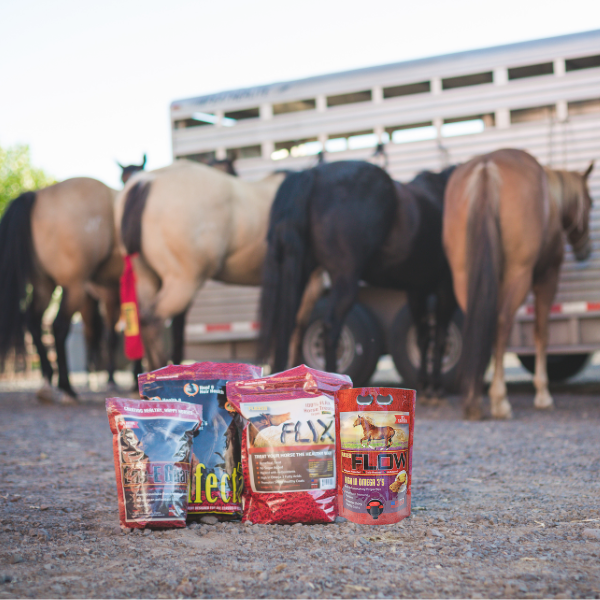
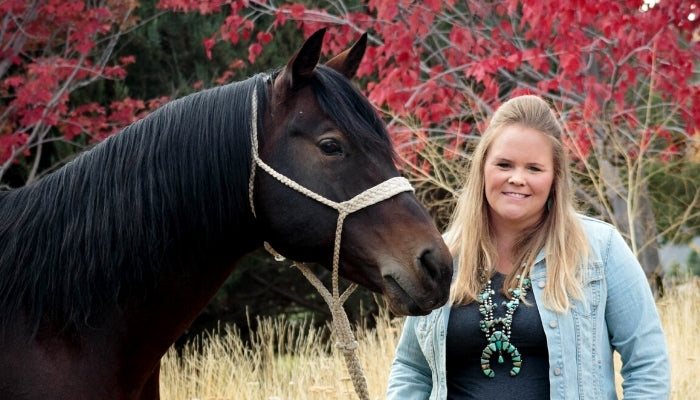
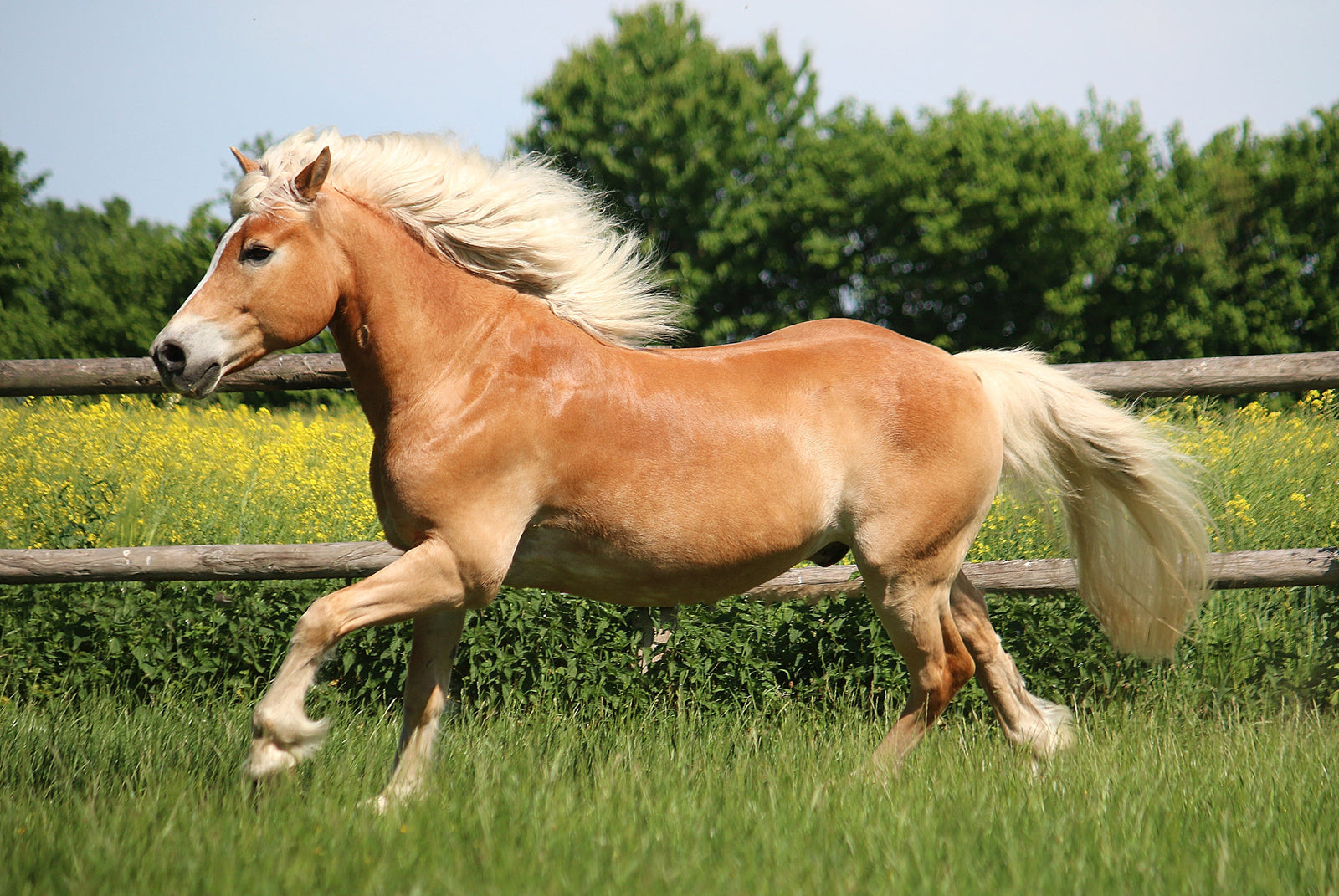
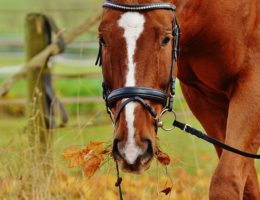
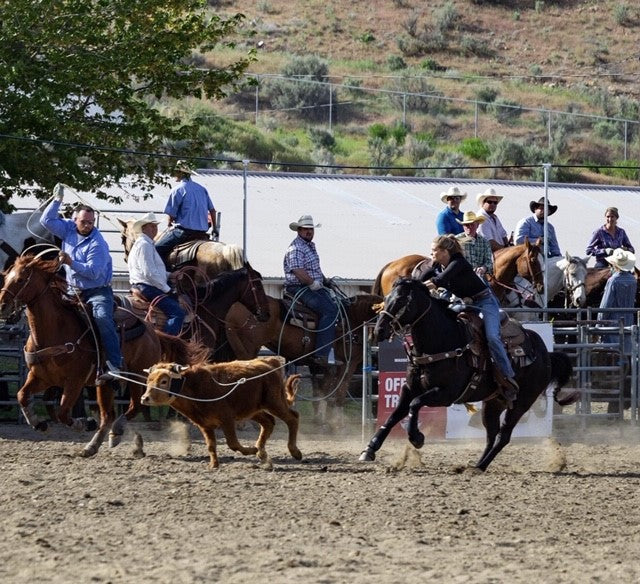
Emily South
July 05, 2022
I have a young very mare-ish mare with PSSM. Very few active symptoms but she does well on a calming supplement. And a digestive supplement. Any suggestions for calming. Was looking at using Trifecta so it will be used with that.
A complete vitamin-mineral supplement to fill any deficiencies that are typically lacking in hay * A gut supplement with prebiotics, probiotics, and live yeast cultures to help stabilize the gut flora to help ensure they are getting the most out of the feed they consume * A great hoof supplement with 32 mg biotin, plus zinc, methionine, and MSM to help keep strong hooves * An outstanding joint supplement with 5,000 mg MSM and glucosamine, and 100 mg hyaluronic acid———
Horse Guard replied:
Thank you for the question. I would recommend Trifecta<https://www.horseguard.com/shop/store/horse-health/overall/trifecta/>. It will provide:
In addition, I would recommend a forage based diet, and add fat to add more calories to her diet. Fat works well for excitable horses as well as PSSM horses.
Unfortunately, there hasn’t been a lot of research proving effectiveness of many of the ingredients in calming supplement. So, if you have found one that works well with your mare I would recommend using it. One ingredient that has shown merit in research trials is alpha-casozepine which is the active ingredient in Zylkene.
We hope this helps.